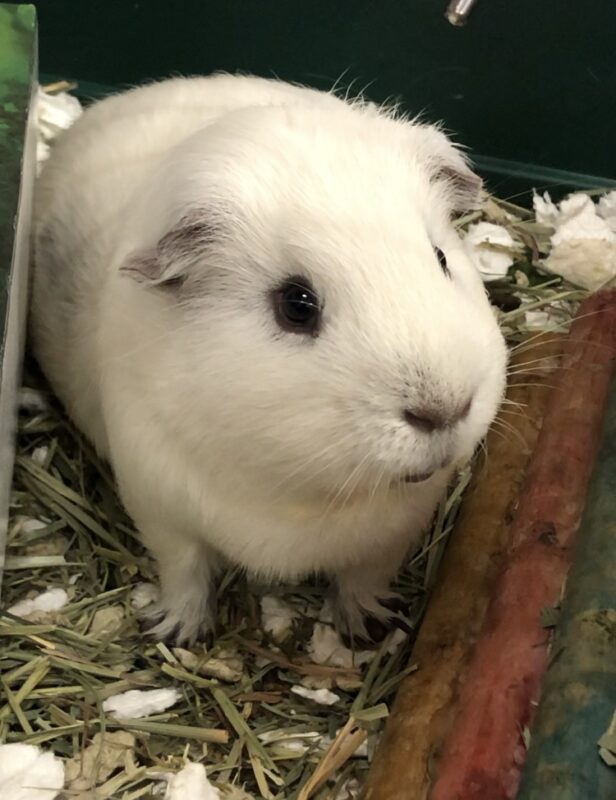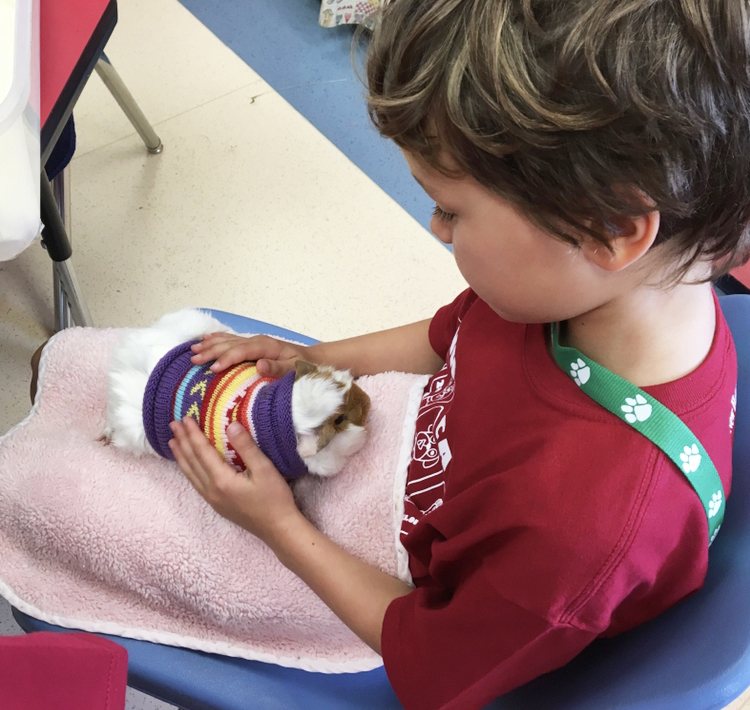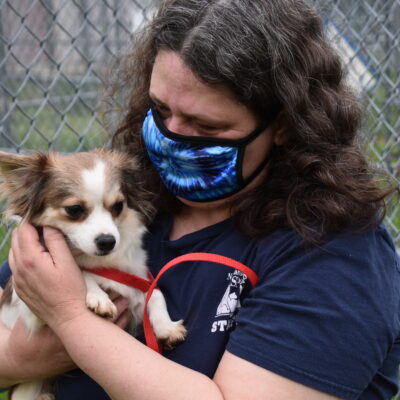
Parents often ask me what the best pet is for their child and at what age. A quick search of the internet will find many different opinions from lots of different sources. Some experts are clearly biased in their judgement or have a hidden agenda for their endorsement of the perfect childhood pet. I would like to offer my opinion gleaned from my experiences as a mom to four kids who had lots of small animal pets as well having been a Humane Educator at the NHSPCA for the past twenty years. I have personally witnessed thousands of child and pet interactions over the years!
I think, generally speaking, most parents and children will consider getting one of the more common small animal pets such as hamsters, guinea pigs, gerbils, rats, mice, ferrets, rabbits, degus, chinchillas and hedgehogs. So, these are what I’ve considered in my making my choice.
My suggestion for the very best first pet for a family with children is a pair of guinea pigs. These amazing little critters are so wonderful in so many ways. Again, this is only my opinion from my extensive observation!
To begin with, guinea pigs are simply adorable to look at. They have cute little faces, soft strokable ears, interesting color patterns and coat variations and highly boopable noses! In case you are not familiar, a “boop” is a way of showing affection instead of kissing by gently tapping an animal on the nose with your finger, often accompanied by playfully saying “Boop!”
Guinea pigs love to be groomed but don’t need professional help with that. A soft brush made specifically for small mammals or human babies will do just fine and children often really enjoy this activity. Unless a guinea pig is elderly or suffers from some type of medical condition, he or she may never need to be bathed. They stay remarkably clean and fresh-smelling as long as you assist by cleaning their home on a regular basis.
Guinea pigs don’t have tails and this is good because you don’t have to worry about a child accidentally (or not) pulling the pet’s tail and causing pain or injury. Several small animals from the list above can suffer serious injury if the tail is pulled and will often need veterinary care.
Speaking of veterinary care, guinea pigs are usually very healthy and don’t need a lot of medical intervention very often. And the things that can go wrong are often easily identified such as upper respiratory infections or bladder stones. Often it can be easy to find a veterinarian who is familiar with guinea pigs and can diagnose an illness without a lot of expensive tests.
Of course, the pet owner must do their part to keep a guinea pig healthy. Guinea pig food pellets are relatively inexpensive and easy to find especially compared to some of the more exotic small animals. Unlimited hay is required but that is easy to obtain. And even though guinea pigs need to have fresh vegetables as part of their diet, they can usually eat whatever you are eating for a fruit or vegetable at your own meals. And it’s a great way for children to enjoy and learn the importance of eating healthy foods. The only thing that may be needed is some extra Vitamin C in your guinea pig’s diet and there are several simple ways to get that.
A guinea pig’s life span is a plus with children too. They typically live long enough that kids can develop a close relationship and don’t have to say good-bye too soon. But not such a long life that parents are trying to figure out what to do with the pet when the child goes off to college!
Guinea pigs rarely bite. I’ve heard lots of people tell me that they’ve dealt with guinea pig bites but I think they must have been exaggerations. If children (and adults!) keep their fingers away from a guinea pig’s mouth, there is very little chance that the guinea pig will bite. In the classroom, we’ve had a few “nibbles”, or putting teeth on an arm or shirt to test whether it’s edible but never any bleeding, severe pain or need for medical attention. Guinea pigs don’t use their teeth for defense and are not typically aggressive. A guinea pig that feels threatened will run away to escape danger.
Which brings me to my next plus in choosing guinea pigs. Even though a guinea pig will instinctively run away to escape danger, they are not very fast. Very young guinea pigs seem to have more energy and might get frisky but most of the adult guinea pigs we’ve had in the classroom are fairly slow and prefer to hang out rather than race away. Some of the small pets mentioned above are very quick and chasing them can be very frustrating. And when trying to grab at a fast-moving pet, that’s when a lot of bites happen.
Guinea pigs seem to enjoy being held and cuddled which is something that many children like doing with their small pets. They are large enough to be quite sturdy when held and parents usually don’t have to worry about them being squeezed to death (literally) by a young child. That has been the fate of a few smaller pets that I’ve heard about.
In general, guinea pigs are quiet. Their contented “purring” sound is quite low and sometimes hard to hear which encourages children to be quiet in order to hear it. The only time a guinea pig gets really loud is when they know that yummy fruits and vegetables are coming their way such as a plastic bag crinkling or the refrigerator door opening.
And last but not least for certain children, with extremely close adult supervision, guinea pigs are quite willing to play dress-up! If you check on the Etsy website, you will find literally thousands of items of clothing specifically made for guinea pigs. Matching hair ribbons and hats complete the outfit!

I’m sure there will be many people who disagree with my opinion on this subject! But my experience seems to point towards guinea pigs as being the perfect first pet for a child. As for what age a child should “get” a pet, that really depends on how much work a parent wants to put into the care and ownership of the pet. I would say that a 3-year-old can get enjoyment from a pet guinea pig with parent doing all the care while modeling for the child. And a 12-year-old can do all the care! Everything in between will be on a sliding scale.
Having a pet in the family can be such an asset as they teach about caring, compassion and responsibility. And spread joy and kindness too!
Erin Burger is the Humane Education Manager at the New Hampshire SPCA.
Other resources:
Things to Consider Before Adopting a Guinea Pig

